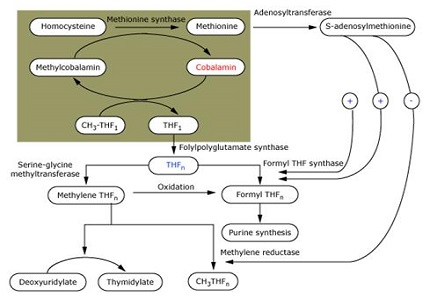Role of Estimation of Serum Ferritin, Vitamin B12 and Folic Acid in Management of Beta Thalassemic Children
Abstract
Objective: To estimate the levels of serum Ferritin, Vitamin B12 and Folic acid in beta thalassemic children.
Introduction: Beta thalassemia is the most common genetically transmitted haematological disorder in Indian children. In thalassemia, there is ineffective erythropoiesis which can be either due to excess iron accumulation, or low vitamin B12 and folate status.
Study Design: The case-control study was carried out at G.G.S. Medical College and Hospital, Faridkot in department of Biochemistry in collaboration with department of Paediatrics.
Materials and methods: In this case-control study, 50 children with with beta thalassemia major in the age group of 4 to 8 years were studied for estimation of serum ferritin, vitamin B12 and folic acid. The control group consisted of 50 age and sex matched healthy children.
Results: The study group had much higher serum ferritin levels as compared to healthy controls (p< 0.001). On other hand, the thalassemic children had much lower vitamin B12 level in comparison with healthy controls (p< 0.001). The folic acid levels were also much lower in thalassemic children as compared to healthy controls (p< 0.001).
Conclusion: Biochemical screening for levels of serum ferritin, vitamin B12 and folic acid is of paramount importance in management of thalassemic children. Supplementation of vitamin B12 and folic acid could be helpful to improve erythropoiesis in thalassemic children who have proven deficiency of these vitamins, though further studies are needed to establish this hypothesis.
Downloads
References
2. Tyagil S, Kabra M, Tandon N, Saxena R, Pati HP, Choudhary VP. Clinico-haematological profile of thalassemia patients. International Journal of Human Genetics 2003; 3: 251-258. PMCID: PMC 3955643.
3. Maheshwari M, Sadhna A, Kabra M, Menon PSN. Carrier screening and prenatal diagnosis of Beta-thalassemia. Indian Paediatrics 1999; 36 (11): 1119-1125. [PubMed]
4. Andrews NC. Disorders of Iron Metabolism. New England Journal of Medicine 1999; 341(26): 1986-1995. PMID: 10607817. [PubMed]
5. Kong WN, Zhao SE, Duan XL, Yang Z, Qian ZM, Chang YZ. Decreased DMT1 and increased Ferroportin 1 expression is the mechanism of reduced iron retention in macrophages by erythropoietin. Journal of Cell Biochemistry 2008; 104(2): 629-641.
6. Hershko C, Konijn AM, Link G. Iron chelators for thalassaemia. British Journal of Haematology 1998; 101(3): 399-406. [PubMed]
7. Granier T, Langlois d’Estaintot B, Gallois B, Chevalier JM, Precigoux G, Santambrogio P et al. Structural description of the active sites of mouse L-chain ferritin at 1.2 Aº resolution. Journal of Biological Inorganic Chemistry 2003; 8 (1): 105-111.
8. Ryan GM, Torelli J. Beyond cholesterol: 7 life-saving heart disease tests that your doctor may not give you. New York: St. Martin’s Griffin; 2005.
9. Kennedy A, Kohn M, Lammi A, Clarke S. Iron status and haematological changes in adolescent female in patients with anorexia nervosa. Journal of Paediatric Child Health 40 (8): 430-432.
10. Herbert V. The nutritional anaemias. Hospital Practice 1980; 15(3): 65-83. [PubMed]
11. Jandl JH, Greenberg MS: Bone marrow failure due to relative nutritional deficiency in Cooley's hemolytic anemia. New England Journal of Medicine 1959; 260: 461-468. Doi: 10.1056/NEJM.195903052601002.
12. Luhby AL, Cooperman JM, Lopez R, Giorgia AJ: Vitamin B12 metabolism in thalassemia major. Annals of New York Academy of Sciences 1969; 165: 444-460. PMID: 4900400. [PubMed]
3. Yamada H, Saito H. Relationship between body storage iron and erythropoietic disorders. Acta haematologica Jpn 1982; 45: 1245-1257. [PubMed]
14. Thorpe SJ. Automated Immunoassay methods for ferritin. Clinical Chemistry Laboratory Medicine 2008; 46 (10): 1450-1457. Doi 10.1515/CCLM.2008.304.
15. Lotz J, Hafner G, Prellwitz W. Reference study for ferritin assays. Kurzmitteilung Clinical Laboratory 1997; 43(11): 993-994.
16. Clinical Laboratory Technical Procedure Manuals Approved Guidelines – 4th edition 2006.
17. Smith AD, Refsum H. Do we need to reconsider the desirable blood levels of vitamin B12? Journal of Internal Medicine 2012; 271(2): 179-182. Doi: 10.1111/j.1365-2796.2011.02485.x [PubMed]
18. Selhub J, Jacques PF, Dallal G, Choumenkovitch S, Rogers G. The use of blood concentrations of vitamins and their respective functional indicators to define folate and vitamin B12 status. Food and Nutrition Bulletin 2008; 29: 567-573.doi:10.1177/15648265080292 S110.
19. Prakash VK.Nutritional anaemia in young children with focus on Asia and India. Indian Journal of Community Medicine 2011; 36(1): 8-16. [PubMed]
20. Asma S, Boga C, Ozdogu H. Safety, therapeutic effectiveness and cost of parenteral iron therapy. International Journal of Hematology 2009; 90(1): 24-7. [PubMed]
21. Kremastinos DT, Toutouzas PK, Vyssoulis GP, Venetis CA, Avgoustakis DG. Iron overload and left ventricular performance in beta Thalassemia. Acta Cardiology 1984; 39(1) 29-40. [PubMed]
22. Crayn, Elizabeth MD. Vitamin B12 deficiency, recognition and management. Primary Care Case Reviews 2002; 5(2): 53-60.
23. Mazzone A, Vezzoli M, Ottini E. Masked deficit of B(12) and folic acid in thalassemia. American Journal of Hematology 2001; 67(4): 274. Doi 10.1002/ajh.1132. [PubMed]
24. Henshaw LA, Tizzard JL, Booth K, Beard MEJ. Haemoglobin A2 levels in vitamin B12 and folate deficiency. Journal of Clinical Pathology 1978; 31: 960-962. [PubMed]
25. Tamagnini GP, Lopes MC, Castenheira ME, Wainscoat JS, Wood WG. β- thalassemia-Portguise type: Clinical, haematologial and molecular studies of a newly defined form of β thalassemia. British Journal of Haematology 1983; 54: 189- 200.
26. Silva AE, Varella-Garcia M. Plasma folate and vitamin B12 levels in beta-thalassemia heterozygotes. Brazilian Journal of Medical and Biological Research 1989; 22 (10):1225-1228. Doi/10.1002/9780470696705.ref
27. Weatherall DJ, Clegg JB: The thalassemia syndromes. Oxford Blackwell Scientific Publications. Third edition, 1981.



 OAI - Open Archives Initiative
OAI - Open Archives Initiative


